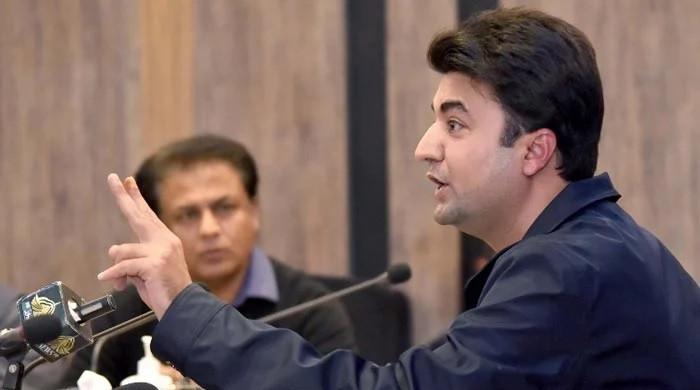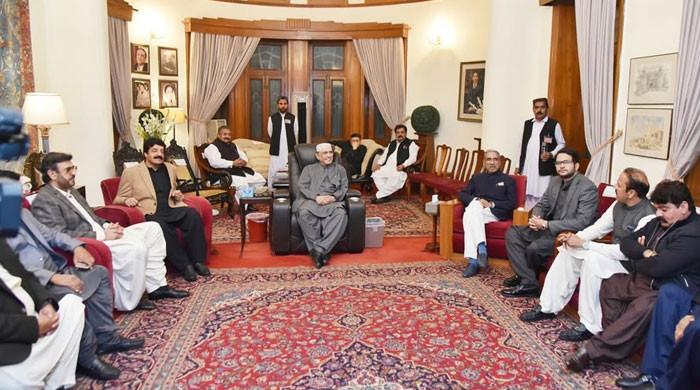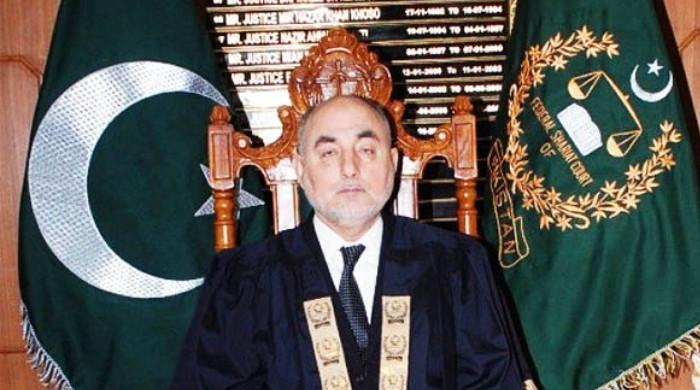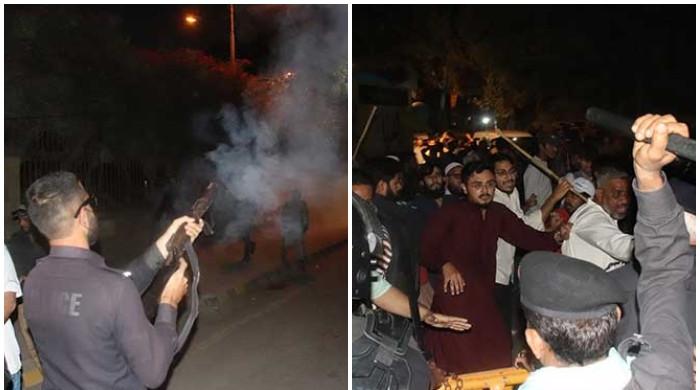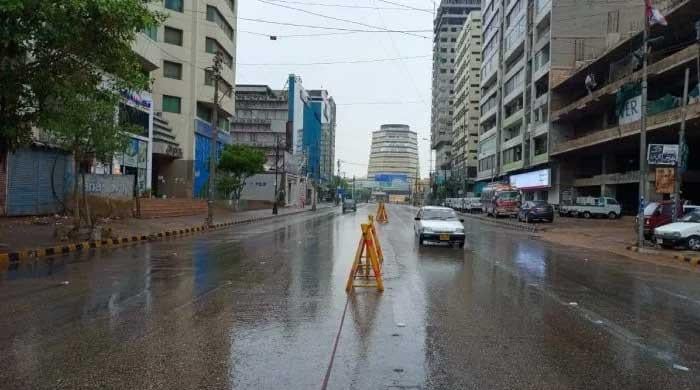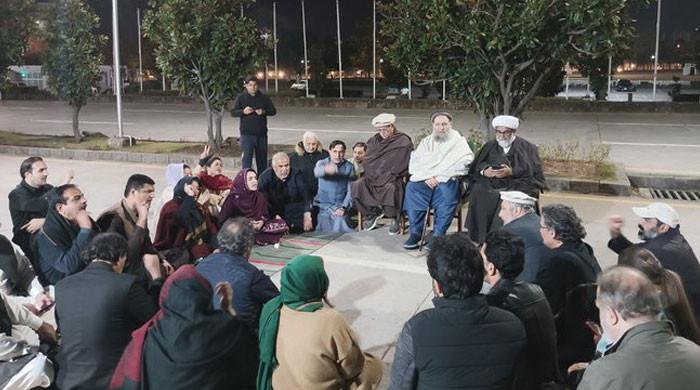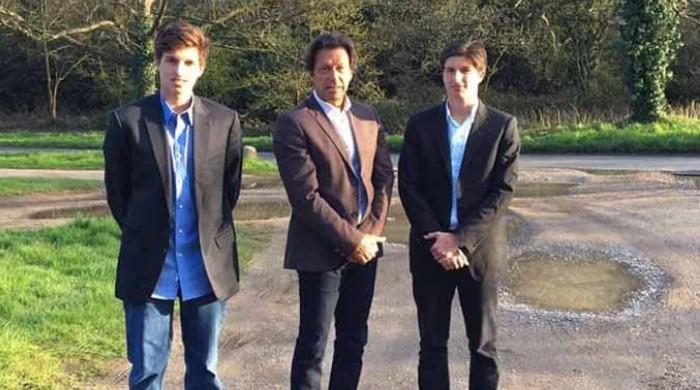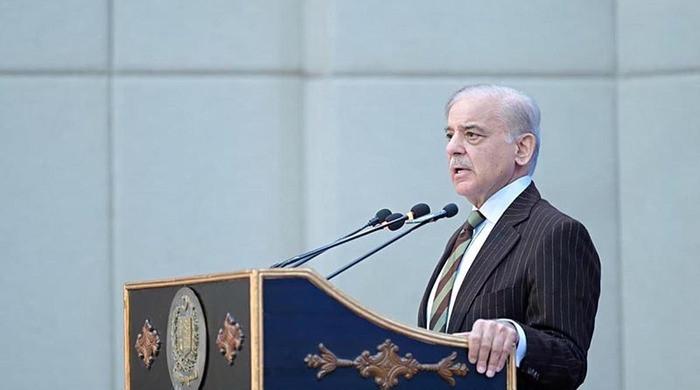CJP takes suo motu notice over delay in Punjab, KP elections
Justice Bandial constitutes nine-member larger bench to hear case today at 2pm
February 22, 2023
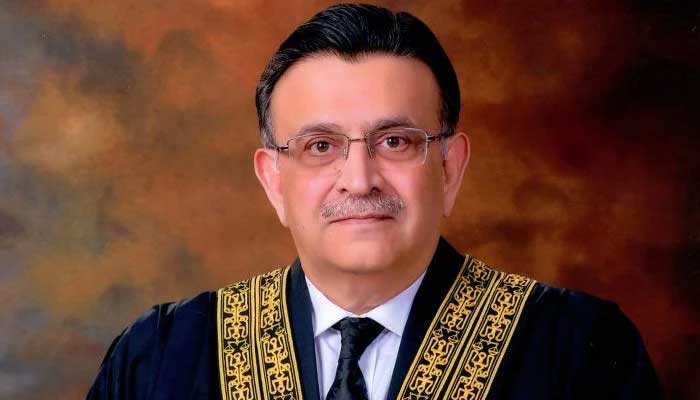
- Matter was sent to chief justice by two-member bench.
- Bench to assess eligibility on issuing elections' date.
- CJ says govt's responsibility to conduct polls in Punjab, KP.
ISLAMABAD: Chief Justice of Pakistan (CJP) Umar Ata Bandial Wednesday night took a suo motu notice of an apparent delay in the elections of Punjab and Khyber Pakhtunkhwa (KP) and also formed a larger bench to hear the case.
The development comes two days after President Dr Arif Alvi fixed April 9 as the date for elections to the provincial assemblies of Punjab and KP — the move condemned by the government as "unconstitutional and illegal".
Amid the situation, the Election Commission of Pakistan (ECP) sought guidance from the attorney general of Pakistan (AGP) and other legal experts — but no official announcement has been made so far.
The nine-member bench includes:
- Justice Umar Ata Bandial
- Justice Ijaz Ul Ahsan
- Justice Syed Mansoor Ali Shah
- Justice Munib Akhtar
- Justice Yahya Afridi
- Justice Sayyed Mazahar Ali Akbar Naqvi
- Justice Jamal Khan Mandokhail
- Justice Muhammad Ali Mazhar
- Justice Athar Minallah
The bench will hear the case on Thursday at 2pm. The matter was sent to the chief justice seeking the suo motu by a two-member Supreme Court bench comprising Justice Ijaz Ul Ahsan and Justice Mazahir Ali Akbar Naqvi in the Lahore Capital City Police Officer (CCPO) Ghulam Mehmood Dogar case on February 16.
According to the chief justice's statement, the bench will assess who is eligible to issue the date for polls, the constitutional responsibility of the federation and provinces, and who will fulfil the constitutional responsibility of conducting elections and when.
“It is the government’s responsibility to conduct elections in Punjab and KP according to the Constitution,” the top court’s statement read.
The Supreme Court added that the two provincial assemblies were dissolved on January 14 and 18, respectively. “Under Article 224 (2), polls should be held within 90 days of the assembly dissolution. The Constitution mandates that polls be held within 90 days.”
The country’s top court also said that requests for the date of elections were also received from the Islamabad High Court bar, and speakers of KP and Punjab assemblies.
CJP's statement
The CJP, in the statement, highlighted how the two assemblies were dissolved and almost immediately after the dissolution a question was raised as to who had the constitutional responsibility and authority to appoint the date of the general election to obtain the mandate of the electorate and elect fresh assemblies.
“It is to be noted that Article 224(2) requires that a general election be held within a period of 90 days after the dissolution, and the use of the word “shall” indicates that this is, prima facie, a constitutional imperative,” he added.
CJP Bandial further said that in respect of the appointment of the date for the holding of the general elections to the dissolved provincial assemblies there are several petitions already filed in various courts of Pakistan.
“By judgement dated 10.02.2023 a learned single judge in Chambers concluded that the authority lay with the ECP and called upon the same to immediately announce the date of election of the provincial assembly of Punjab with the notification specifying reasons, after consultation with the governor of Punjab, being the constitutional head of the province, to ensure that the elections are held not later than ninety days as per the mandate of the Constitution.
“Reportedly both the governor and the election commission have filed Intra Court Appeals which are pending before a learned Division Bench of the high court.”
According to the statement, as the governor did not act on the advice tendered by the then chief minister Parvez Elahi and made no order dissolving the assembly, he does not have the responsibility or authority to appoint the date for the general election.
“The Election Commission has, it appears, also taken the position that under the Constitution it has no authority to appoint the date for a general election, though it has categorically stated (as reported in the public media, both print and electronic) that it is fully committed to conducting the said election in accordance with the Constitution.
“At the same time, the governor of KP province has also not appointed a date for the holding of the general election and a petition in this regard is pending before the Peshawar High Court,” as per the statement.
The chief justice, in its statement, wrote that the president has taken the position that it is “he who has the authority and responsibility for appointing a date for the general elections, in terms as provided in section 57(1) of the Elections Act, 2017”.
It maintained that despite a month gone by since the dissolution, even the matter of appointing the date of general polls, which is the first step towards the holding of the elections, has not been resolve.
“Constitutional authorities appear to hold divergent, and perhaps even conflicting, views on the issue,” Justice Bandial's statement read while highlighting that several federal ministers, who reflect the view taken by the federal cabinet as a while, have contested the authority asserted by the president.
The country's top judge stated that there is a “lack of clarity on a matter of high constitutional importance”. His statement also highlighted the ECP’s statements regarding the unavailability of required assistance and support, in particular by the provision of necessary funds, personnel and security, which is needed to conduct the elections as per the Constitution.
“Having considered the above, and the material placed before me, I am of the view that the issues raised require immediate consideration and resolution by this court. Several provisions of the Constitution need to be considered, as also the relevant sections of the Elections Act,” the statement, signed by Justice Bandial, read.
It further added: “In particular, the issues involve, prima facie, a consideration of Article 17 of the Constitution and enforcement, inter alia, of the fundamental right of political parties and the citizens who form the electorates in the Punjab and KP provinces to exercise their right to elect representatives of their choice to constitute fresh assemblies and provincial cabinets.”
The chief justice further said that this is necessary for government in the two provinces to be carried on in accordance with the Constitution. “These matters involve the performance of constitutional obligations of great public importance apart from calling for faithful constitutional enforcement.”




